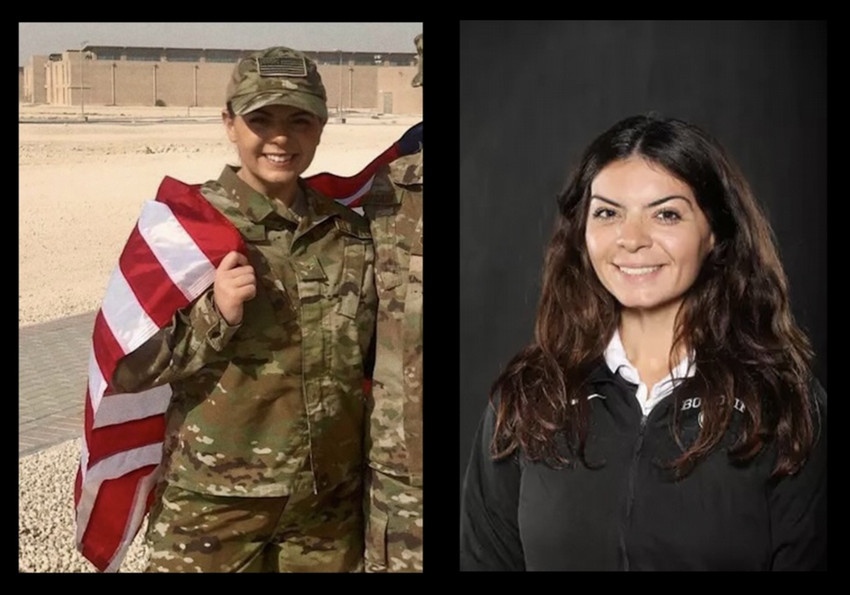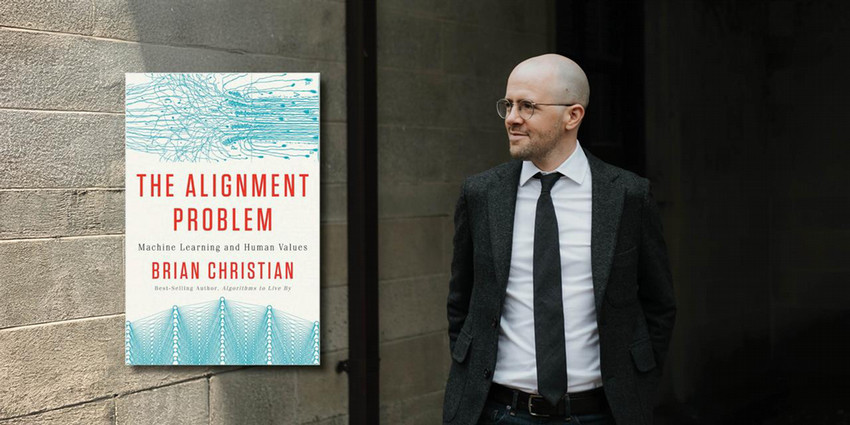Each Day Anew
By Neill Reilly ’71To professor Fritz Koelln, happiness was a by-product of a life well lived, not a goal unto itself.
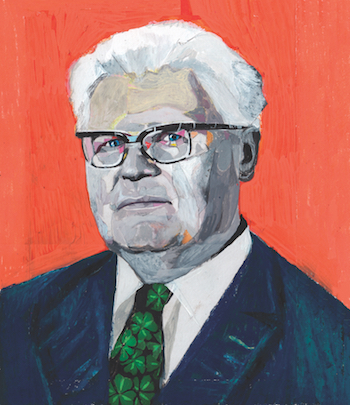
I was blessed to have had professor Fritz Koelln as my teacher. He taught a senior seminar called Friedrich Nietzsche: A Problematic Figure for Our Time that was the most challenging and rewarding class I have ever taken. Professor Koelln was sixty-nine years old when he taught this course. He spoke seven languages. He was demanding and profound, and he had an inner warmth that was truly heartfelt. The students could barely keep up with his intellectual vitality. He was like a stellar runner who sets the pace. Everyone just tried to stay as close to him as we could. During class, we respectfully called him “Professor Koelln,” but he was affectionately known as “Fritz.”
Fritz walked into the first class in September of 1970. He had piercing blue eyes and a ruddy, florid face that would become red when he was excited. He was about five-foot-seven, with a body like a short, offensive tackle, broad and stout. His once-red hair had turned shocking white with age. He always wore a white shirt, tie with a tie clip, blue blazer, and gray pants. He carried an old black leather book bag that was weighed down with books. He muttered to himself and opened the bag. As he took out each individual book, he checked and affirmed that he had brought his intended book and delicately placed each one on a table. A dozen books emerged from Fritz’s book bag like a circus trick. He assembled a small library on the table next to his chair.
Fritz had left Germany in 1928 at the age of twenty-seven. His American English still had a German accent that was mixed with a Cambridge pronunciation. At first, it sounded a little stilted, but after you became accustomed to it, it sounded distinctively Fritz. When he arrived at Bowdoin in 1929, he audited a course from a fellow professor and continued auditing a course every semester for forty-two years. He laughed that he was the oldest nonmatriculated student in Bowdoin’s history. There is the famous quotation from Chaucer on the steps of the Moulton Union: “And gladly wolde he lerne, and gladly teche” (The Canterbury Tales, General Prologue, line 310). This is the definition of the ideal teacher. Fortunately, I had Fritz, who loved to learn and teach.
Like a falcon, he circled an idea from various perspectives and then swooped down to make it his own.
At first Fritz appeared difficult to follow in class. He led us through thoughts that seemed disconnected. After a few classes, it became apparent that we were not working hard enough to realize that his digressions and tangents were directly connected with the theme. We were comfortable with linear thoughts. Fritz operated with rhythmic thoughts that were more organic in nature. With Fritz, you could almost see thoughts evolving. They had the structure of a gyre or a spiral. Like a falcon, he circled an idea from various perspectives and then swooped down to make it his own. Fritz’s approach from radically different perspectives would not abide a onesided perspective. One of his constant phrases was “Avoid dogma, avoid dogma.” Fritz espoused creativity. One of his favorite quotations from Goethe was “each day anew.” The longer Goethe quotation provides insight into Fritz’s inner life: “This is the highest wisdom that I own; freedom and life are earned by those alone who conquer them each day anew” (Faust, Part II).
Fritz had the amazing ability to listen and to address your question. He was dramatic and funny. He would make you feel like you were in the presence of Nietzsche, Hegel, Wagner, and other great thinkers. He would start to read an English translation, shake his head, and switch to the German, which might have a reference to a Latin or Greek quotation, which he would also recite or read. He was totally engaged in the subject matter. He would act out certain scenes. After vigorous lectures, he would have worked up a sweat.
During the seminar, Fritz expounded on Nietzsche’s vision that Western civilization had gone into an intellectual and moral abyss and had lost its bearings. Reading and reciting Nietzsche with Fritz was like being in a thunderstorm with lightning and thunder all around and inside you. The thoughts were palpable. Nietzsche wrote dramatic scenes that engaged us, but while he presented the problem, Nietzsche did not offer a solution. Fritz hinted that the solution would come from another person. At the end of the last class, he mentioned Rudolf Steiner and then ended the seminar, put his books into his book bag, and left.
I was amazed that Fritz did not expound on Steiner and later went to Fritz’s home. Fritz and his wife, Bine, resided at 7 Page Street in Brunswick, which formed one of his favorite puns: “When in doubt, turn to Page 7.” This invitation was given to thousands of Bowdoin students, and he meant it. I asked Fritz about Rudolf Steiner. He smiled, waved his index finger at me, and stated, “Remember, you asked me that question.” For the next fifteen years we discussed little else but Steiner. I asked why he did not teach a course on Steiner at Bowdoin. Fritz replied, “It cannot be done. Steiner is not an academic subject.” He paused for effect. “But if a student would ask me to give a free seminar on Steiner, got a classroom, a day, and a time, I would consider it.” I got the hint and asked Fritz if he would allow me to do such. He smiled and said yes.
The free seminar was an oral version of Theosophy, with Fritz describing humanity’s spiritual nature. It was stunning in breadth and depth. Fritz did not use notes. He lived these thoughts, and they were a natural progression for him, like a seed maturing into a plant. Sixty or more people attended his class on Steiner. Twelve students from my class of 220 became involved in anthroposophic activity after graduation. He introduced hundreds to Steiner, the founder of the Waldorf School and anthroposophy. I have since read Steiner for more than forty-five years.
“What would you desire after you have left your body? What would you miss the most?”
Even though Fritz was nearly fifty years older than I was, we became close friends. I would often visit his home. Fritz’s study was a small library with shelves of books, a desk, photos, a couch, and a piano. To see Fritz playing the piano was the definition of kinetic activity. He pounded the keys with joy and enthusiasm. This study became a sanctum sanctorum, where Fritz would have deep conversations. During a conversation on Kamaloca, Fritz described how each individual must purge his earthly desires upon entering the spiritual world. It would be very painful to have unrequited materialistic desires without a body to satiate them. He stated it was very similar to the concept of purgatory. He then asked me, “What would you desire after you have left your body? What would you miss the most?” I was about to say “running” but thought he would not understand that desire. So I went to numbers two and three. “Chocolate chip cookies and vanilla ice cream.” Fritz looked at me incredulously, shook his head, kindly smiled at my naiveté, and said, “Maybe this part will not be so hard for you.”
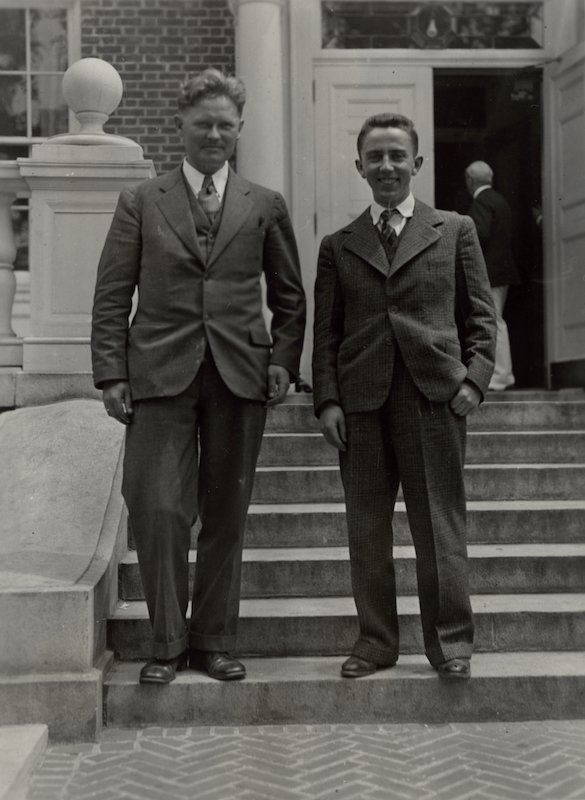
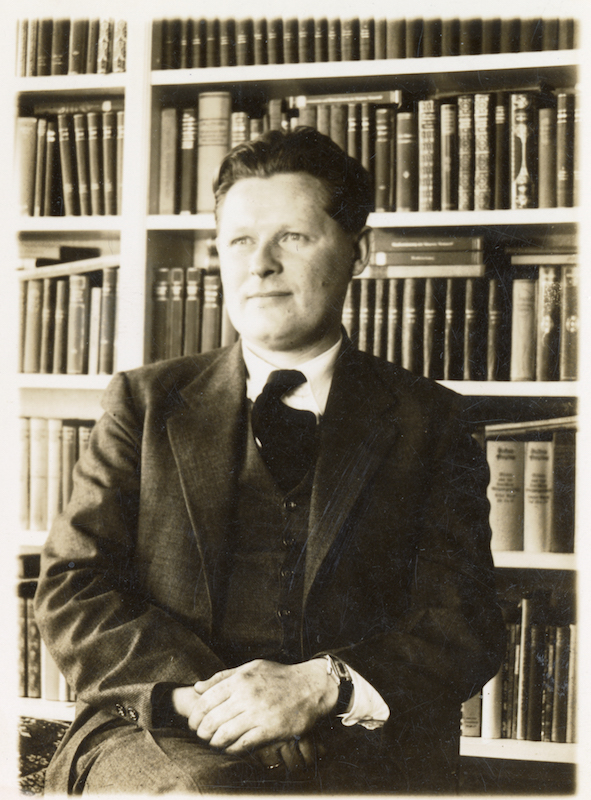
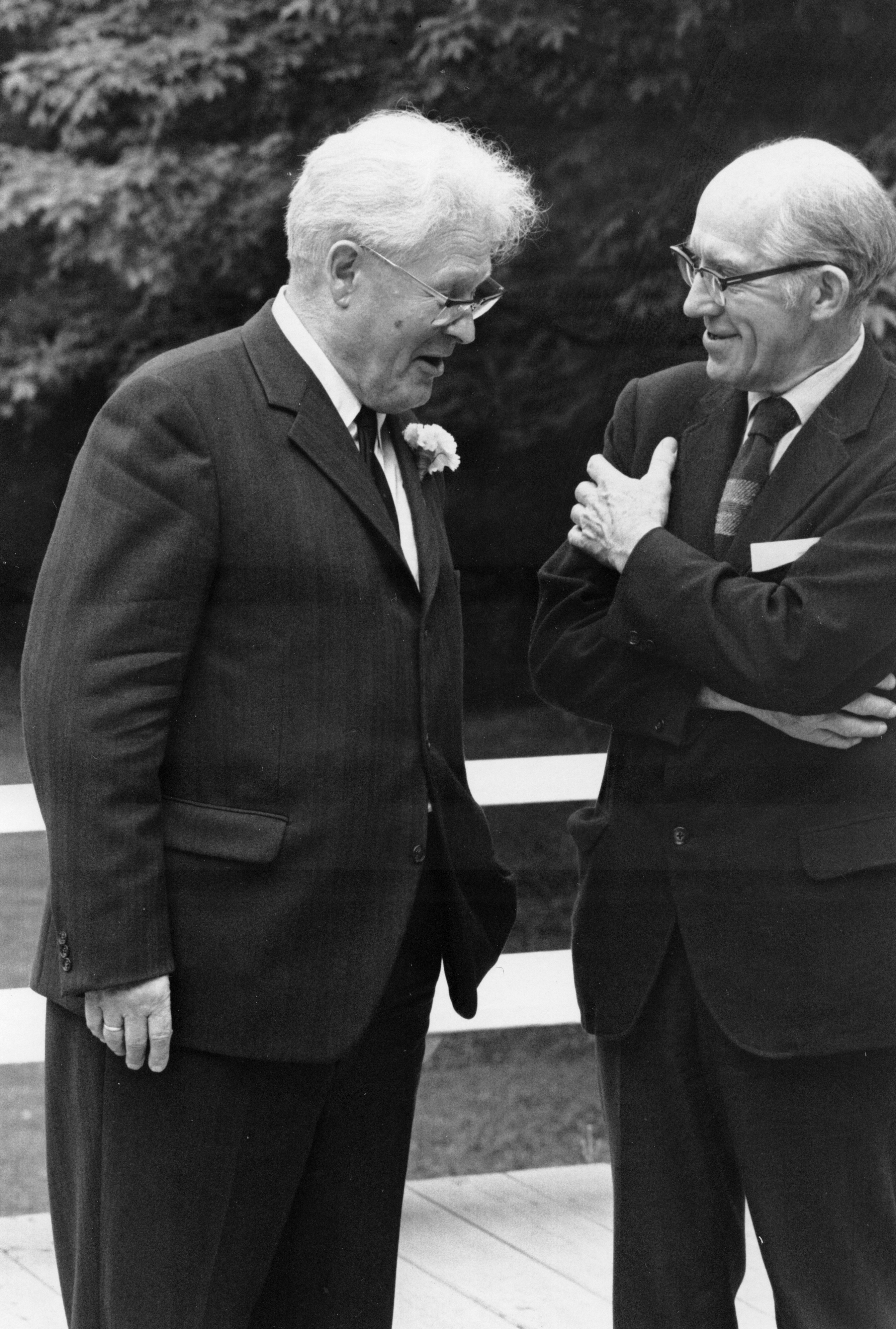
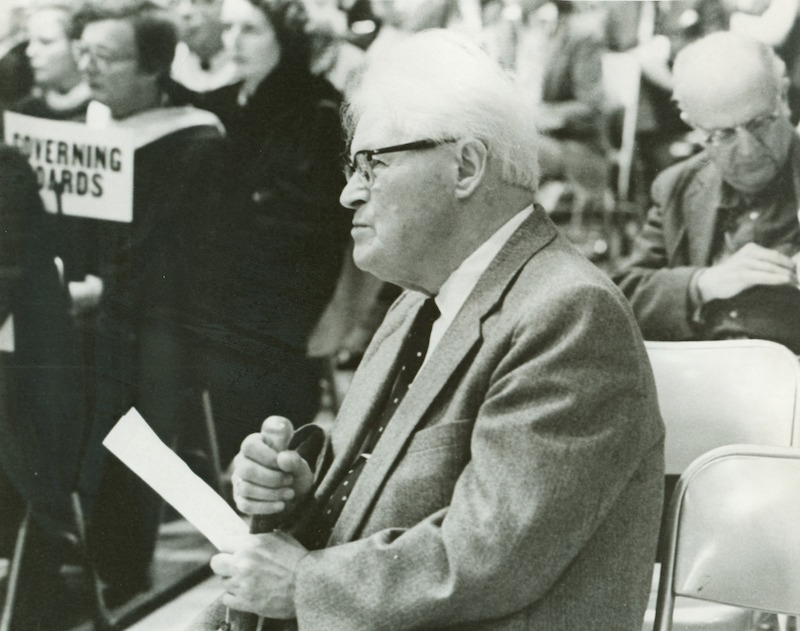

One of Fritz’s favorite questions was to ask Bowdoin seniors what they wanted after graduation. Fritz was stunned that most answered with a Hallmark superficiality. The most common answer was “I want to be happy.” Fritz would then state, “Oh boy, do you have a lot to learn.” For Fritz, happiness was a by-product of a meaningful life. Happiness was not a goal.
Fritz later taught at Emerson College in England, where I visited him. One day, as we were walking, Fritz asked me a question. “Two men, an old man like me and a young man like you, were walking together to a train station. The old man was carrying heavy luggage. The young man had no luggage. Who gets there first?” I answered, “The young man.” Fritz smiled and asked me, “What part of ‘together’ do you not understand?”
Fritz had the uncanny ability to judge how much someone could understand of complex ideas and go up to that point and then not beyond the individual’s capacity. He could also remember where the last conversation had left off and proceed from there.
For five years after retiring from Bowdoin, Fritz taught a three-week Goethe class at the school where I taught. He stayed with my wife and me in our home. Each dinnertime was an advanced course in Christology, Western literature, philosophy, and anthroposophy. One of the lasting images I have of Fritz is standing outside Kimberton Farms school. Two young girls were waiting to be picked up by their mother. They were turning graceful cartwheels on the grass. Fritz looked at them, smiled, and said, “I can’t wait to come back and do that again!” Fritz experienced ideas as living realities, not as dead concepts. He suggested trying on an idea as you would a jacket and walking around in it for a while. If it fit, keep it. If not, discard it. Fritz thought of reincarnation as a Christian idea. We are given an opportunity to amend our previous transgressions and to improve our Christlike nature. To Fritz it was hubris to assume we could do this in one life.
As he got into his eighties, he once showed me where carpenters were installing shelves in a back room of his home. Fritz said, “This is the room where I am going to die.” There was no bed yet, just shelves. “These shelves will have my favorite 3,000 books so I don’t have to go up or down steps.” His books were his friends and companions during life, and he wanted to visit them again and again.
Finding four-leaf clovers was a special skill that Fritz practiced everywhere. He said you just had to wait and they would make themselves known. You would often find Fritz staring at the ground, seemingly in deep thought. He was actually hunting for four-leaf clovers.
Fritz’s kindness extended to people he had never met. When my son Kevin was born, Fritz and Bine wrote him a greeting card that included a four-leaf clover inside. These were their words to a newborn child, almost as if from a fairy tale or myth:
Dear little Kevin, thank you for coming to live your earthly life with mother Linda, father Neill, and sister Nicole and all others who will love you. May you be blessed with all the blessings heaven has in store for you. And may you be a blessing for everyone else who comes your way. We wish that your dear mother will recover soon from giving birth to you and also thank your dear father very much for announcing unto us your happy arrival. We rejoice with them.Fritz was Michaelic. He was not afraid of confronting evil. At one point he said, “Your generation is very brave!” I had always thought the opposite, that my generation was weak and lacked grit. I looked puzzled. Fritz immediately started talking of how, before we are born, we view the world and its environs as we are incarnating. Fritz said to see the darkness of World War I, World War II, and the Holocaust demanded brave souls who still wanted to incarnate. He then stated that you had to be brave to be born into a modern world that was so spiritually dark. He became emphatic. “You must carry the light through the darkness, no matter how dark it becomes. Always carry the light. Always carry the light and protect it.”
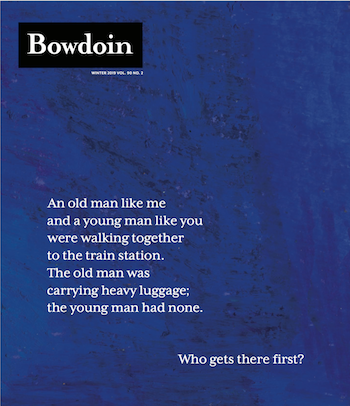
Fritz Carl August Koelln, Professor of German and George Taylor Files Professor of Modern Languages Emeritus, taught at Bowdoin from 1929–1971. He died at home in Brunswick in 1986 at age eighty-five.
Neill Reilly ’71, director of business development at SS&C Technologies, spent six years as a Waldorf high school English teacher, inspired by his friend and mentor Fritz Koelln. This essay is excerpted from Reilly’s forthcoming book, Look at What We Can Become: Portraits of Five Remarkable Individuals, available via SteinerBooks.org and the Bowdoin Store.

